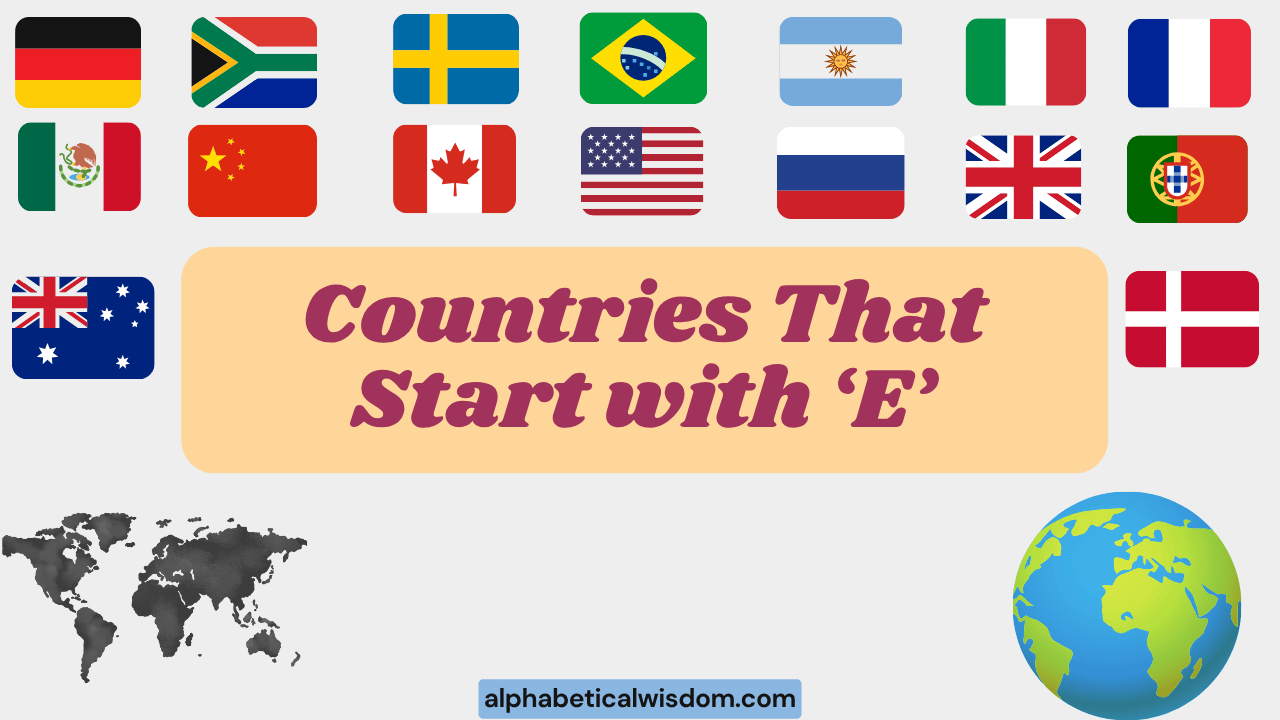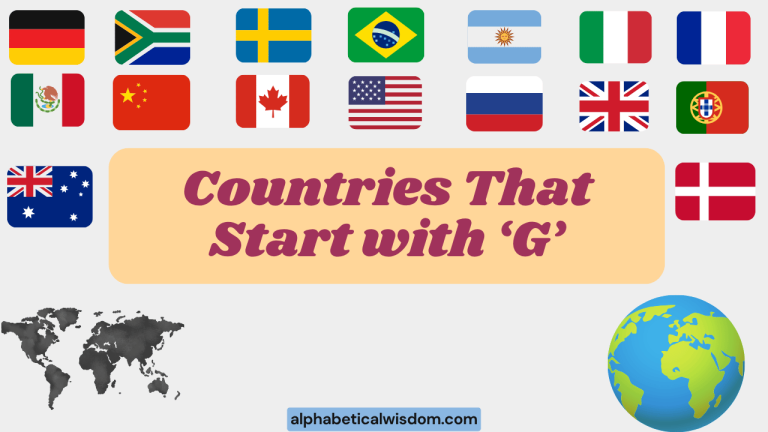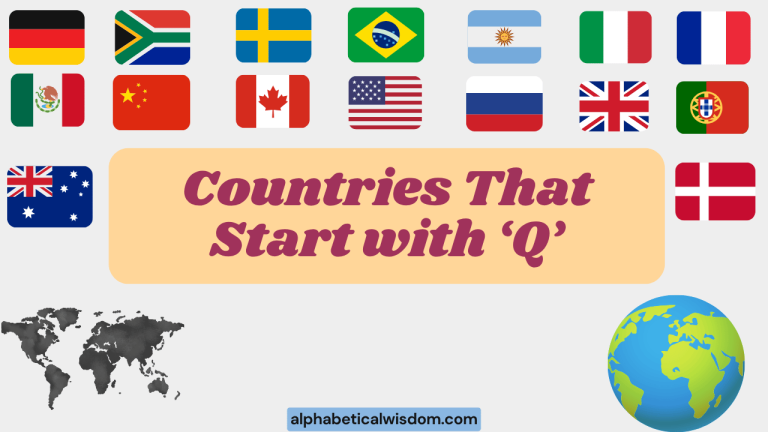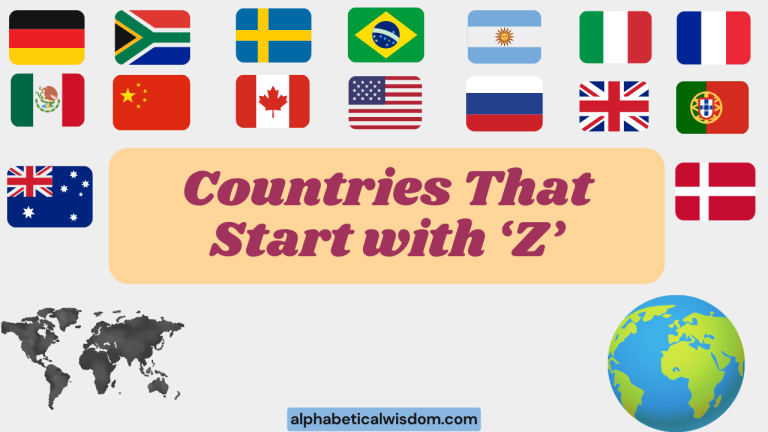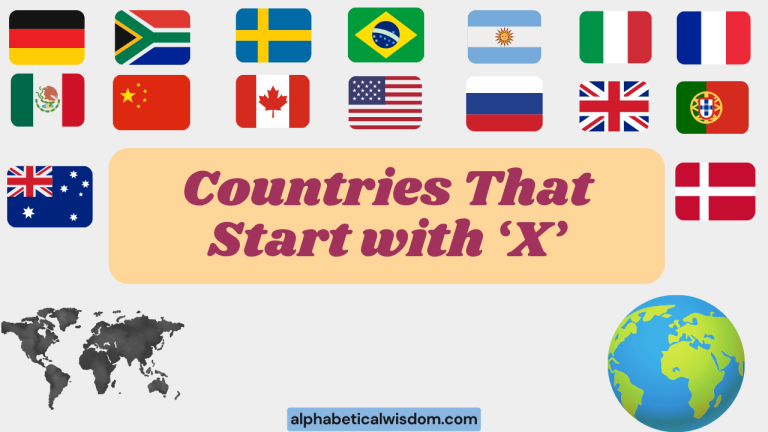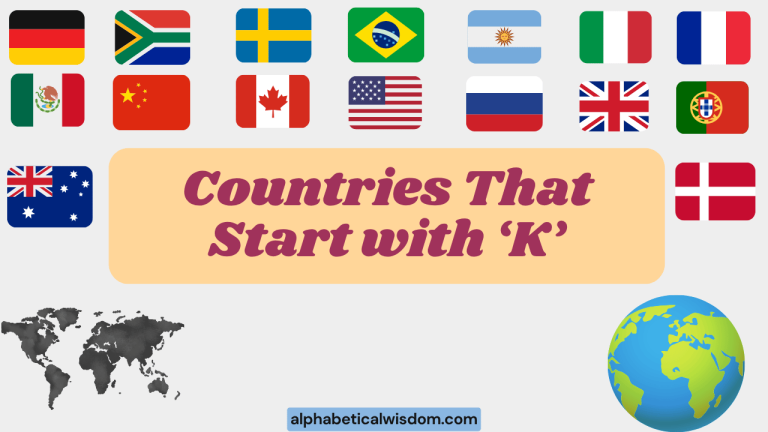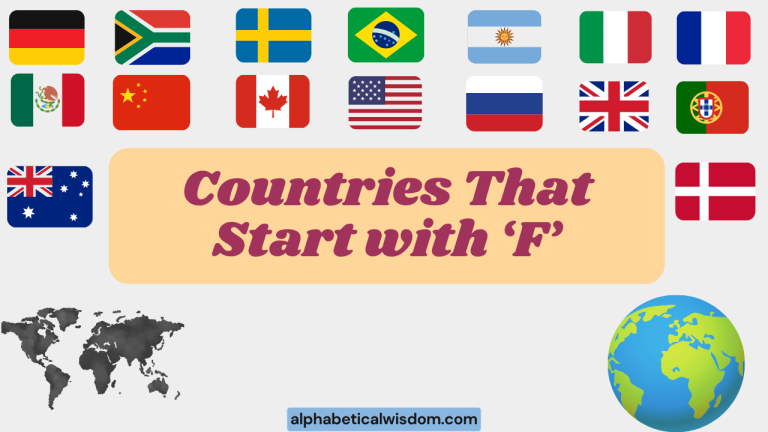Countries That Start With E: A Grammar & Usage Guide
Understanding how to correctly use country names, especially those starting with the letter “E,” is essential for clear and accurate communication in English. This article provides a comprehensive guide to the grammar rules and usage conventions associated with these countries.
Whether you’re a student, traveler, or language enthusiast, this guide will help you master the nuances of referring to countries beginning with “E” in various contexts, ensuring your writing and speech are both grammatically correct and culturally sensitive.
Table of Contents
- Introduction
- Definition: Countries Starting with “E”
- Structural Breakdown of Country Names
- Types and Categories of Country Names
- Examples of Countries Starting with “E”
- Usage Rules for Countries Starting with “E”
- Common Mistakes and How to Avoid Them
- Practice Exercises
- Advanced Topics
- Frequently Asked Questions (FAQ)
- Conclusion
Definition: Countries Starting with “E”
A country is a geographically defined area with its own government, population, and sovereignty. When we talk about countries starting with the letter “E,” we are referring to those sovereign states whose official English names begin with the letter “E.” These countries, like all others, function as nouns in sentences, serving as subjects, objects, or complements.
Understanding the proper use of these names is crucial for accurate and respectful communication.
The classification of these countries can be based on geographical location (e.g., Europe, Africa) or geopolitical factors. Their function in a sentence is primarily as a proper noun, requiring capitalization.
The context in which these country names are used can vary widely, from news reports and academic papers to casual conversations and travel guides. Each context demands a certain level of formality and accuracy.
Structural Breakdown of Country Names
The structure of a country’s name can be simple or complex. Some country names consist of a single word, while others include multiple words, articles, or descriptive terms. Understanding these structural elements helps in correctly using the names in sentences. Single-word country names are straightforward: Egypt, Ecuador. Multi-word names may include an article (The) or a descriptive adjective (e.g., Equatorial Guinea). Compound names may consist of two or more words that are commonly used together to refer to the country. The order of words in the name is fixed and should not be altered.
The grammatical gender of a country name is generally neutral, meaning it takes the pronoun “it.” However, in some contexts, especially in literature or informal speech, a country may be referred to with a feminine pronoun, reflecting a sense of connection or personification. However, this is less common in formal writing.
Also, the plural forms of country names are rarely used, except when referring to the people of that country (e.g., “The Egyptians are known for their ancient civilization”).
Types and Categories of Country Names
Country names can be categorized based on various criteria, including geographical location, political status, and historical significance. Here are some ways to classify countries starting with “E”:
Geographical Location
Countries can be grouped by continent or region. For example, countries in Europe, Africa, or South America that start with “E” can be categorized separately.
Political Status
Countries can be classified based on their form of government (e.g., republic, monarchy) or their international affiliations (e.g., members of the European Union, the African Union).
Historical Significance
Some countries have a rich history and have played significant roles in global events. These countries can be grouped based on their historical importance.
Linguistic Origin
The etymology of a country’s name can also be a basis for categorization. Some names have Latin, Greek, or indigenous origins.
For example, the name “Egypt” has Greek origins, derived from the word “Aegyptus.”
Examples of Countries Starting with “E”
Here are some examples of countries that start with the letter “E,” categorized by continent.
Countries in Europe
Europe has several countries beginning with “E.” Understanding their names and associated adjectives is crucial for geographical and grammatical accuracy. The table below provides examples of European countries starting with “E,” along with their corresponding adjectives and demonyms.
Knowing these forms is essential for describing people, culture, and other aspects related to these countries.
| Country | Adjective | Demonym |
|---|---|---|
| Estonia | Estonian | Estonian |
| Country | Adjective | Demonym |
|---|---|---|
| Estonia | Estonian | Estonian |
Countries in Africa
Africa boasts a rich diversity of countries, some of which begin with the letter “E.” These countries each have unique cultural and linguistic identities. The following table lists African countries starting with “E,” along with their corresponding adjectives and demonyms.
This information is useful for describing people, places, and things associated with these countries in a grammatically correct manner.
| Country | Adjective | Demonym |
|---|---|---|
| Egypt | Egyptian | Egyptian |
| Equatorial Guinea | Equatorial Guinean | Equatorial Guinean |
| Eritrea | Eritrean | Eritrean |
| Eswatini (formerly Swaziland) | Eswatini, Swazi | Eswatini, Swazi |
Countries in Asia
While not as numerous as in Africa, Asia also has countries whose names begin with “E.” These countries are integral to the continent’s diverse cultural landscape. The following table presents Asian countries starting with “E,” alongside their corresponding adjectives and demonyms, facilitating accurate and culturally sensitive communication.
| Country | Adjective | Demonym |
|---|---|---|
| East Timor (Timor-Leste) | East Timorese, Timorese | East Timorese, Timorese |
Countries in North America
There are no countries in North America that start with the letter “E”.
Countries in South America
South America has a couple of important countries starting with “E.” The following table covers them, including adjectives and demonyms.
| Country | Adjective | Demonym |
|---|---|---|
| Ecuador | Ecuadorian | Ecuadorian |
Countries in Oceania
There are no countries in Oceania that start with the letter “E”.
Usage Rules for Countries Starting with “E”
Using country names correctly involves understanding several key grammatical rules. These rules cover the use of articles, capitalization, adjective formation, and preposition usage.
Use of Articles (The vs. No Article)
Most country names do not require the definite article “the.” However, there are exceptions. Countries with plural names or those that are part of a larger political entity often take “the.” For example, “the United States,” “the Netherlands,” and “the Philippines” require the article “the.” In the case of countries starting with “E,” none of them necessitate the use of “the.” You would say “I visited Egypt” and not “I visited the Egypt.”
Using the article incorrectly can change the meaning or sound unnatural. For example, “She is from the Estonia” is incorrect; the correct form is “She is from Estonia.” The absence of the article is a key characteristic of most country names.
Capitalization Rules
Country names are proper nouns and must always be capitalized. This rule applies regardless of where the name appears in a sentence.
For example, “Egypt is a country in Africa” and “I want to travel to Estonia next year.” The first letter of each word in the country’s name should be capitalized, even if it’s a multi-word name like “Equatorial Guinea.”
Incorrect capitalization can lead to confusion and make your writing appear unprofessional. For instance, writing “egypt is a country…” is grammatically incorrect and shows a lack of attention to detail.
Always double-check the capitalization of country names.
Forming Adjectives and Nationalities
To describe something as being from a particular country, you often use an adjective derived from the country’s name. For example, “Egyptian art” or “Estonian cuisine.” These adjectives are also capitalized since they are derived from proper nouns.
The formation of these adjectives can vary; some are straightforward (e.g., Estonia → Estonian), while others are less predictable (e.g., Egypt → Egyptian).
The nationality of a person is also usually derived from the country’s name. For example, a person from Ecuador is called an Ecuadorian.
These demonyms are also capitalized. It’s important to use the correct adjective or demonym to avoid causing offense or confusion.
For example, referring to someone from Eritrea as “Ethiopian” would be incorrect and insensitive.
| Country | Adjective | Demonym | Example Sentence (Adjective) | Example Sentence (Demonym) |
|---|---|---|---|---|
| Egypt | Egyptian | Egyptian | We visited the Egyptian pyramids. | She is an Egyptian. |
| Estonia | Estonian | Estonian | I love Estonian folk music. | He is an Estonian. |
| Equatorial Guinea | Equatorial Guinean | Equatorial Guinean | The Equatorial Guinean rainforest is beautiful. | She is an Equatorial Guinean. |
| Eritrea | Eritrean | Eritrean | The Eritrean landscape is diverse. | He is an Eritrean. |
| Eswatini | Eswatini, Swazi | Eswatini, Swazi | Eswatini culture is rich in tradition. | She is from Eswatini. |
| East Timor | East Timorese, Timorese | East Timorese, Timorese | East Timorese coffee is well-regarded. | He is an East Timorese. |
| Ecuador | Ecuadorian | Ecuadorian | Ecuadorian cuisine is flavorful. | She is an Ecuadorian. |
Prepositions with Country Names
The prepositions used with country names depend on the context. “In” is used to indicate location within a country: “I live in Egypt.” “To” is used to indicate movement towards a country: “I am going to Estonia.” “From” is used to indicate origin: “She is from Ecuador.” “Of” is used to indicate belonging or association: “The history of Eritrea is fascinating.”
Using the wrong preposition can alter the meaning of the sentence. For example, “I live to Egypt” is incorrect; it should be “I live in Egypt.” Choosing the correct preposition is essential for clarity and accuracy.
Common Mistakes and How to Avoid Them
Several common mistakes are made when using country names, especially those starting with “E.” Being aware of these errors can help you avoid them.
| Mistake | Correct Form | Explanation |
|---|---|---|
| Using “the” before a country name (e.g., the Egypt) | Egypt | Most country names do not require “the.” |
| Incorrect capitalization (e.g., egypt) | Egypt | Country names are proper nouns and must be capitalized. |
| Using the wrong adjective (e.g., Equitorial Guinean) | Equatorial Guinean | Ensure you use the correct adjective form. |
| Misspelling the country name (e.g., Esawatini) | Eswatini | Double-check the spelling of the country name. |
| Incorrect preposition usage (e.g., I am going at Estonia) | I am going to Estonia | Use the correct preposition based on the context. |
| Using “Swaziland” instead of “Eswatini” | Eswatini | Be aware of official name changes of countries. |
Practice Exercises
Test your knowledge with these practice exercises. Each exercise focuses on different aspects of using country names that start with “E.”
Exercise 1: Fill in the Blanks
Complete the following sentences with the correct form of the country name.
| Question | Answer |
|---|---|
| 1. The capital of ______ is Cairo. | Egypt |
| 2. I am planning a trip to ______. | Estonia |
| 3. The official language of ______ is Spanish and French. | Equatorial Guinea |
| 4. People from ______ are called Eritreans. | Eritrea |
| 5. ______ is a small kingdom in Southern Africa. | Eswatini |
| 6. Dili is the capital city of ______. | East Timor |
| 7. I want to try ______ ceviche. | Ecuadorian |
| 8. Have you ever been to ______? | Estonia |
| 9. She is from ______. | Egypt |
| 10. The culture of ______ is fascinating. | Eritrea |
Exercise 2: Correct the Errors
Identify and correct the errors in the following sentences.
| Question | Corrected Answer |
|---|---|
| 1. I live at the egypt. | I live in Egypt. |
| 2. estonia is a beautiful country. | Estonia is a beautiful country. |
| 3. I am going to the equatorial guinea. | I am going to Equatorial Guinea. |
| 4. He is a Eritrean citizen. | He is an Eritrean citizen. |
| 5. She is from eswatini. | She is from Eswatini. |
| 6. The capital of east timor is Dili. | The capital of East Timor is Dili. |
| 7. I love equadorian chocolate. | I love Ecuadorian chocolate. |
| 8. She visited the estonia last year. | She visited Estonia last year. |
| 9. They are from a egypt. | They are from Egypt. |
| 10. The eritrean culture is rich. | The Eritrean culture is rich. |
Exercise 3: Sentence Construction
Construct sentences using the following country names and adjectives.
| Country/Adjective | Example Sentence |
|---|---|
| Egypt (Egyptian) | The Egyptian pyramids are a wonder of the world. |
| Estonia (Estonian) | Estonian folk songs are beautiful. |
| Equatorial Guinea (Equatorial Guinean) | The Equatorial Guinean climate is tropical. |
| Eritrea (Eritrean) | Eritrean coffee is known for its unique flavor. |
| Eswatini (Swazi) | Swazi culture is rich in traditions. |
| East Timor (East Timorese) | East Timorese textiles are colorful and intricate. |
| Ecuador (Ecuadorian) | Ecuadorian bananas are exported worldwide. |
| Visiting (Estonia) | I am visiting Estonia this summer. |
| From (Egypt) | He is from Egypt. |
| Culture (Eritrea) | The culture of Eritrea is diverse. |
Advanced Topics
For advanced learners, understanding the historical context and political nuances associated with country names can further enhance their linguistic skills.
Historical and Former Country Names
Some countries have undergone name changes due to political or historical events. For example, Eswatini was formerly known as Swaziland.
Being aware of these changes is important for understanding historical texts and discussions.
It’s also important to understand why the name change occurred. For example, the name “Swaziland” was derived from King Mswati II, a 19th-century ruler.
The country officially changed its name to Eswatini in 2018 to reflect its pre-colonial name, which means “land of the Swazi.”
Political and Cultural Context
The use of country names can sometimes be influenced by political or cultural sensitivities. For example, referring to Taiwan as “Taiwan, China” is a politically charged statement that reflects China’s claim over the island.
Being aware of these sensitivities is crucial for respectful communication.
Similarly, using outdated or colonial-era names can be offensive. Always use the official and current name of a country to avoid causing offense.
Understanding the historical context behind these names can help you make informed choices in your language use.
Frequently Asked Questions (FAQ)
Here are some frequently asked questions about using country names, especially those starting with “E.”
- Why do some country names require “the” while others don’t?
- How do I know which adjective to use for a particular country?
- Is it okay to use the old name “Swaziland” instead of “Eswatini”?
- What should I do if I’m unsure about the correct spelling of a country’s name?
- Are there any countries starting with “E” that are commonly confused with others?
- Why is it important to capitalize country names?
- Can I use feminine pronouns (she/her) to refer to a country?
- What is the difference between an adjective and a demonym?
- How do I use prepositions correctly with country names?
- What are some resources for learning more about country names and their usage?
Country names that are plural or part of a larger political entity often require “the.” For example, “the United States” or “the Netherlands.” Most single-word country names do not require “the.”
Adjectives are usually derived from the country’s name. However, there are exceptions.
Consult a dictionary or grammar guide for the correct form. For example, the adjective for Egypt is Egyptian, and for Estonia, it’s Estonian.
While some people may still recognize “Swaziland,” it is more appropriate and respectful to use the current official name, “Eswatini.” Using the official name shows awareness and respect for the country’s identity.
Always double-check the spelling in a reliable source, such as a dictionary or official government website. Misspelling a country’s name can be seen as disrespectful or unprofessional.
Equatorial Guinea might sometimes be confused with Guinea or Guinea-Bissau, which are different countries. Always ensure you are using the correct name to avoid confusion.
Country names are proper nouns, and capitalization is a fundamental rule of English grammar. Proper capitalization ensures clarity and professionalism in your writing.
While it is sometimes done in literature or informal speech to personify a country, it is generally more appropriate to use neutral pronouns (it/its) in formal writing.
An adjective describes something as being from a particular country (e.g., Egyptian art). A demonym refers to a person from that country (e.g., an Egyptian).
Use “in” to indicate location within a country, “to” to indicate movement towards a country, and “from” to indicate origin.
Dictionaries, grammar guides, and online resources such as Wikipedia and official government websites can provide valuable information about country names and their correct usage.
Conclusion
Mastering the grammar and usage of country names, particularly those starting with the letter “E,” is crucial for effective communication. This guide has covered essential aspects such as capitalization, article usage, adjective formation, and preposition usage.
By understanding and applying these rules, you can avoid common mistakes and communicate with accuracy and respect. Remember to stay updated on any name changes or political sensitivities associated with country names to ensure your language use is always appropriate.
Continual practice and attention to detail are key to mastering these grammar rules. Pay attention to how country names are used in various contexts, and don’t hesitate to consult reliable resources when in doubt.
With consistent effort, you can confidently and accurately use country names in your writing and speech, enhancing your overall communication skills.
